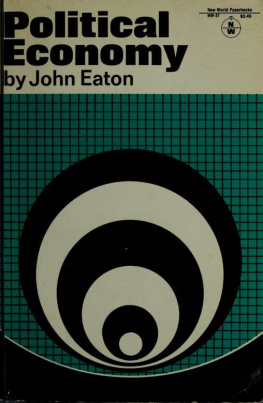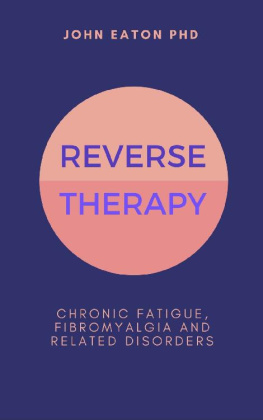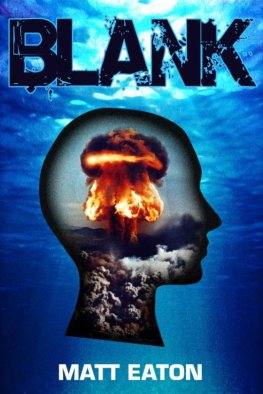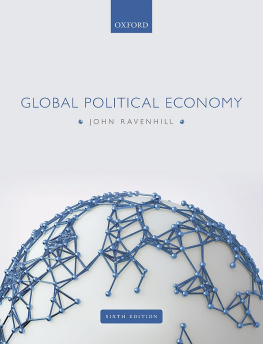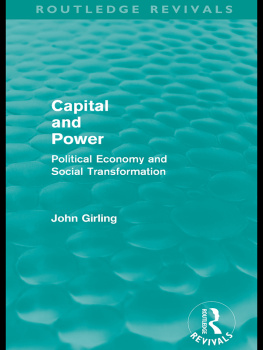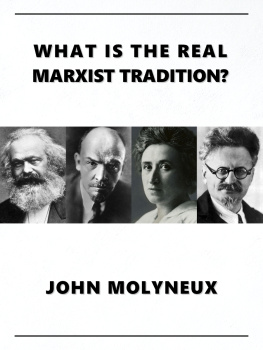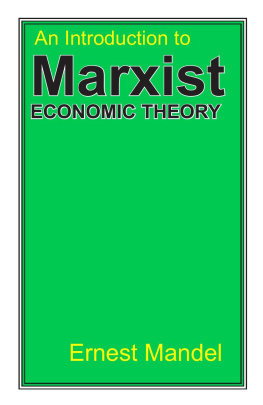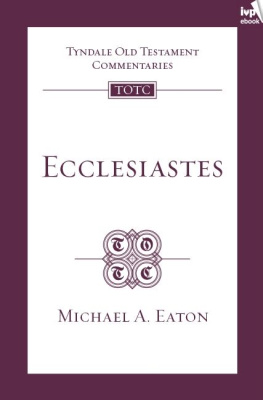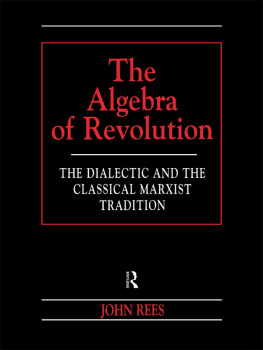John Eaton - Political Economy: A Marxist Textbook
Here you can read online John Eaton - Political Economy: A Marxist Textbook full text of the book (entire story) in english for free. Download pdf and epub, get meaning, cover and reviews about this ebook. City: New York, year: 1966, publisher: International Publishers, genre: Politics. Description of the work, (preface) as well as reviews are available. Best literature library LitArk.com created for fans of good reading and offers a wide selection of genres:
Romance novel
Science fiction
Adventure
Detective
Science
History
Home and family
Prose
Art
Politics
Computer
Non-fiction
Religion
Business
Children
Humor
Choose a favorite category and find really read worthwhile books. Enjoy immersion in the world of imagination, feel the emotions of the characters or learn something new for yourself, make an fascinating discovery.
- Book:Political Economy: A Marxist Textbook
- Author:
- Publisher:International Publishers
- Genre:
- Year:1966
- City:New York
- Rating:5 / 5
- Favourites:Add to favourites
- Your mark:
- 100
- 1
- 2
- 3
- 4
- 5
Political Economy: A Marxist Textbook: summary, description and annotation
We offer to read an annotation, description, summary or preface (depends on what the author of the book "Political Economy: A Marxist Textbook" wrote himself). If you haven't found the necessary information about the book — write in the comments, we will try to find it.
Political Economy: A Marxist Textbook — read online for free the complete book (whole text) full work
Below is the text of the book, divided by pages. System saving the place of the last page read, allows you to conveniently read the book "Political Economy: A Marxist Textbook" online for free, without having to search again every time where you left off. Put a bookmark, and you can go to the page where you finished reading at any time.
Font size:
Interval:
Bookmark:

This book made available by the Internet Archive.




Of the works cited in the text, the following have been published in the United States by International Publishers:
Dobb, Maurice. Soviet Economic Development Since 1917, 1948; new revised edition, 1966.
Studies in the Development of Capitalism, new edition, 1964.
Eaton, John. Socialism in the Nuclear Age, 1962.
Engels, Frederick. The Origin of the Family, Private Property and the State, 1942.
Socialism: Utopian and Scientific, 1935.
Marx, Karl. Capital, Vol. I, edited by Dona Torr, 1947. (Page references in the text, designated by "A," are to this edition.)
Critique of the Gotha Programme, 1938.
"Preface to the Critique of Political Economy" in Reader in Marxist Philosophy, Howard Selsam and Harry Martel, eds., 1963.
Value, Price and Profit, 1935.
Wage-Labour and Capital, 1933.
Marx, Karl and Engels, Frederick. Selected Correspondence, 1846-1895, 1942.
INTRODUCTION
There are considerable differences between this present book and many contemporary text books on economics. The differences begin with differences in definition of the subject matter of economics. Much of current university teaching presents economics as the theory of how men choose between scarce goods that have alternative uses. For example, Cairncross {Introduction to Economics i960, page 14) bases himself on the following definition: "Economics is a social science studying how people attempt to accommodate scarcity to their wants and how these attempts interact through exchange." This approach, it is to be noted, focuses attention more on exchange than on production and more or less excludes the study of economic relations between classes and also the process of development in the economy considered as a whole.
The political economy here presented deals in the main with capitalism as a system of production. It is not directly concerned with the technical side of production but with the relations between men in the process of production and exchange. The process of productionthe labour processis the process by which labour converts the material supplied by nature into wealth, the process of changing nature to serve the needs of man. "It is the everlasting, nature-imposed condition of human existence", writes Marx, "and therefore, is independent of every social phase of that existence, or, rather, is common to every such phase." {Capital, Vol. I, LW p. 184, A pp. 163-4).*
Ever since the dawn of history men have carried on production not individually but together with other men. In the earliest times of savagery men hunted in bands and there was a rough division of tasks between men and women. Today the co-operation of many people is involved in the production of the com
* References to Capital are to the English edition published by F.L.P.H. Moscow and Lawrence and Wishart, London, vol. 1, 1954; vol. 2, 1957; vol. 3, 1959 (LW); to the Allen and Unwin edition of vol. 1, edited by Dona Torr, 1938 (A); and to the Kerr edition of vols. 2 and 3, 1909 (K).
POLITICAL ECONOMY
monest objects. One needs, for example, only to consider how many workers in what widely divided parts of the world have contributed to the production and distribution of the commonplace objects such as pencils, knives, chairs, lubricating oils, nails and so forth.
For many thousands of years primitive men lived together in classless communities; the societies which emerged from this "primitive communism" have been class societies in which the basic class divisions have been between those who own the land or other things (such as buildings or plant) needed for production and those who are compelled to produce for othersexploiters and exploited. This was the character of the ancient slave societies and, after them, of feudalism, and today of capitalism.
Capitalism is a system of social production within which there are exploiters and exploitedthe capitalist and the workers. For the working class exploitation is the starting point in the study of political economy. The need and desire to study social science, to study how human society is organised and how its organisation changes and can be changed, develops out of this experience of exploitation, as a part of the struggle against exploitation. For the capitalists, of course, their starting point is how to maintain their wealth and dominant position, and it is from this standpoint that the problems of economics are approached by them.
The standpoint of this book is that of Marxism and scientific socialism. The starting point for Marx in the development of his ideas was the most advanced philosophical, economic and political thought of nineteenth-century Europe. This he developed on the basis of concrete, scientific study of human society and capitalist society in particular. As a world outlook the strikingly new feature of Marxism is that it looks to no authority other than the world itself and applies to all aspects of reality an approach similar to that of the natural sciences.
The study of change is central to Marxist political economy. It is, says Lenin, "the science dealing with the development of historical systems of social production." Marx made it his aim to find out how capitalism came into being, how and why it changes, how and why it decays. His object was to discover "the economic law of motion of modern society" (Marx, Capital Vol. I, LW p. 10, A p. xix).
The differences between bourgeois and Marxist schools of economics are only in part differences in interpretation and
INTRODUCTION
explanation of actual processes; they are also differences in angle of approach and choice of subject matter. It is as well, for this reason, to be clear that the standpoint of this book in its approach to political economy is that of the interests of the working class. Generally the focusing point of its analysis is the relationship between broad economic classes and in this respect it follows basically in the tradition of "classical economics". "The produce of the earthall that is derived from its surface by the united application of labour, machinery and capital," writes David Ricardo in the Preface to his Principles of Political Economy, "is divided among three classes of the community; namely, the proprietor of the land, the owner of the stock or capital necessary for its cultivation, and the labourers by whose industry it is cultivated. But in different stages of society, the proportions of the whole produce of the earth which will be allotted to each of these classes, under the names of rent, profit, and wages, will be essentially different.... To determine the laws which regulate this distribution, is the principal problem in political economy." (vol. I, page 5, Cambridge University Press edition 1951, ed. Piero Sraffa.)
The aim of this book is to present a reasonably brief but scientifically accurate picture of the economic processes of capitalism. Marx attached the highest importance to scientific accuracy and objectivity; but he and his close friend and collaborator Engels, the originators of the world outlook of Marxism, were not only great intellectuals, they were also fighters for the cause for which their humanity and vision led them to fight. Marx was the enemy of capitalism because he was the enemy of poverty and oppression. In 1867 he wrote as he finished the first volume of Capital: "I had to use every moment in which I was capable of work in order that I might finish the task to which I had sacrificed my health, my happiness in life and my family... if one chose to be an ox one could, of course, turn one's back on the agonies of mankind and look after one's own skin. But I should really have regarded myself as unpractical if I had pegged out without completely finishing my book at least in manuscript."
Font size:
Interval:
Bookmark:
Similar books «Political Economy: A Marxist Textbook»
Look at similar books to Political Economy: A Marxist Textbook. We have selected literature similar in name and meaning in the hope of providing readers with more options to find new, interesting, not yet read works.
Discussion, reviews of the book Political Economy: A Marxist Textbook and just readers' own opinions. Leave your comments, write what you think about the work, its meaning or the main characters. Specify what exactly you liked and what you didn't like, and why you think so.

